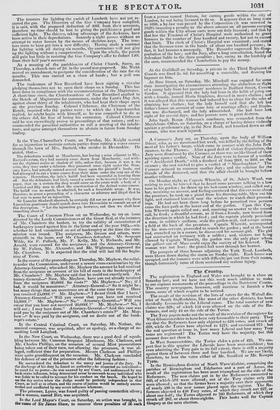In the Vice-Chancellor's Court, on Tuesday, Mr. Knight moved for
an injunction to restrain certain parties from cutting a water-course through the lawn of Mrs. Bastard, who resides in Devonshire. He stated, that— The defendants resided at Manchester, but having a mine adjacent to Mrs. Bastard's estate, they had recently come down from Manchester, and with- out the slightest notice or shadow of title, unless that, because it was a tin mine, they were under a delusion they possessed some right under the Stan. nary Laws, had actually entered several times upon the plaintiff's lands, and had attempted to cut a water-course from their mine under the very eye of the mansion. Heretofore, the lady's bailiff had been successful in hunting them off. But the defendants had lately caused a notice to be inserted in the eonnty paper, that on a certain day they would enter on the estate with a body of a hundred and fifty men to effect the construction of the desired water-course. The bailiff was no match, he admitted, for such a formidable array. It was, therefore, to arrest a proceeding of a character so arbitrary and illegal that he had now to move for an injunction. Sir Lancelot Shadwell observed, he certainly did not see at present why these Lancashire gentlemen should march down into Devonshire to commit an act of this description. " Let the injunction go, however, and then we shall hear something about it."
The Court of Common Pleas sat on Wednesday, to try an issue directed by the Lords Commissioners of the Great Seal, at the instance of Mr. Chambers the banker, to try the validity of commission of bankruptcy issued against him in the latter end of the year 1825,—viz. whether lie had committed an act of bankruptcy at the time the com- mission was issued. The assignees, Mr. Groom and others, were plaintiffs in the issue, and Mr. Chambers defendant. Mr. Sergeant Wilde, Sir F. Pollock, Mr. F. Kelly, Mr. V. Richards, and Mr. Arnold, were counsel for the assignees and the Attorney. General, Sir W. Follett, Mr. Alexander, and Mr. Wightman, appeared for Mr. Chambers. It is expected that the trial will last till the begin- ning of Term.
In the course of the proceedings on Thursday, Mr. Mayhew, the solid- to under the Commission, underwent a severe cross-examination by the Attorney-General ; who asked Mr. Mayhew the amount he had received from the assignees on account of his bill of costs in the bankruptcy of Mr. Chambers? Mr. Mayhew said that he could not exactly tell. At- torney- General—" Now Mr. Mayhew, have you not already received from the assignees 30,000/. for costs?" Mr. Mayhew--" No; if I had, it would be monstrous." Attorney-General—" So it might be ; but many things that are monstrous are at the same time true. Have you received 25,000/. ?" Mr. Mayhew--" I do not think that I have." Attorney-General—." Will you swear that you have not received 15,000/. ?" Mr. Mayhew—" No." Attorney- General—" Will you swear that you have not received 20,000/. ?" Mr. Mayhew—" No, I will not ; I may have done." Attorney- General—"And this sum was paid you by the assignees out of Mr. Chambers's estate ?" Mr. May- hew —" It was paid by the assignees, and no doubt out of the bank- rupt's estate."
In the Central Criminal Court, on Saturday, Mr. Nathan, the musical composer, was acquitted, after an apology, on a charge of as- saulting Lord Langford.
In the New Court, on Wednesday, there was a good deal of squab- bling between Mr. Common Sergeant Mirehouse, Mr. Clarkson, and Mr. Charles Phillips, on the occasion of several Mint prosecutions being taken out of their turn, not allowing the prisoners, it was al- leged, sufficient time for preparation. Messrs Clarkson and Phillips were quite grandiloquent on the occasion. Mr. Clarkson concluded Ins defence of one of the prisoners after the following fashion :
He surrendered the defendant to the mercy and justice of the Jury. In the discharge of his duty lie feared no authority—he respected no individual— he cared for no power—he was unawed by any Court, and undismayed by any back-stairs influence, being determined never to succumb to any individual who was liable to be called to account for his conduct on the bench. He hoped to see the day arrive when the Judge would be perfectly independent in that Court, as well as in others, and the course ofjustice would be entirely uncon- trolled and unaffected by any secret influence whatever. The prisoner, Lyons, was found guilty of passing counterfeit silver; and a woman, named Birt, was acquitted.
In the Lord Mayor's Court, on Saturday, an action was brought, in hie name of Sir James Shaw, to recover three penalties of 51. each
from a person named Hotson, for carting goods within the city of London, he not being licensed to do so. It appears that so long since as 1698, a by-law was passed by the Corporation (it was renewed in 1829) imposing a penalty to the above amount on all persons carrying goods within the City whose carts were not duly licensed; and that by that law the Trustees of Christ's Hospital were authorized to grant licences to the number of four hundred and twenty, but not to exceed that limit. The clerk of Christ's Hospital was examined ; and stated that the licences were in the hands of about one hundred persons ; in fact, it had become a monopoly. The Recorder expressed his disap- probation of the law ; and the Jury, after a long consultation, found the defendant liable to the three penalties ; but, owing to the hardship of the case, recommended the Chamberlain to pay the money.


























 Previous page
Previous page